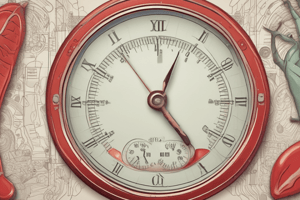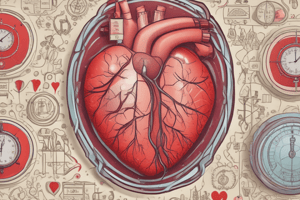Podcast
Questions and Answers
What primarily contributes to increased peripheral vascular resistance in obesity?
What primarily contributes to increased peripheral vascular resistance in obesity?
Which population has the highest prevalence of hypertension according to the data?
Which population has the highest prevalence of hypertension according to the data?
What percentage of individuals with hypertension have primary hypertension?
What percentage of individuals with hypertension have primary hypertension?
What causes increased renal sodium retention leading to hypertension?
What causes increased renal sodium retention leading to hypertension?
Signup and view all the answers
Which mechanism is associated with the increase in extracellular fluid volume in hypertension?
Which mechanism is associated with the increase in extracellular fluid volume in hypertension?
Signup and view all the answers
What is the role of genetic alterations in the development of hypertension?
What is the role of genetic alterations in the development of hypertension?
Signup and view all the answers
What is often referred to as the 'silent killer'?
What is often referred to as the 'silent killer'?
Signup and view all the answers
How does decreased vasodilation of the arterioles contribute to hypertension?
How does decreased vasodilation of the arterioles contribute to hypertension?
Signup and view all the answers
What is a common early symptom of hypertension that may lead to further complications?
What is a common early symptom of hypertension that may lead to further complications?
Signup and view all the answers
Which lifestyle change is NOT recommended for preventing hypertension?
Which lifestyle change is NOT recommended for preventing hypertension?
Signup and view all the answers
What causes chest pain in patients with untreated hypertension?
What causes chest pain in patients with untreated hypertension?
Signup and view all the answers
Which dietary change is recommended as part of the DASH diet?
Which dietary change is recommended as part of the DASH diet?
Signup and view all the answers
What complication can result from untreated hypertension affecting the kidneys?
What complication can result from untreated hypertension affecting the kidneys?
Signup and view all the answers
What is a blood pressure sodium intake recommendation for hypertension prevention?
What is a blood pressure sodium intake recommendation for hypertension prevention?
Signup and view all the answers
What is a recommended frequency and duration for physical activity to help prevent hypertension?
What is a recommended frequency and duration for physical activity to help prevent hypertension?
Signup and view all the answers
What diagnostic measure can be used to assess potential organ damage in hypertension patients?
What diagnostic measure can be used to assess potential organ damage in hypertension patients?
Signup and view all the answers
What is the blood pressure reading classification for stage 1 hypertension?
What is the blood pressure reading classification for stage 1 hypertension?
Signup and view all the answers
What is the correct target blood pressure to maintain for hypertensive treatment?
What is the correct target blood pressure to maintain for hypertensive treatment?
Signup and view all the answers
What is the main purpose of hypertensive treatment?
What is the main purpose of hypertensive treatment?
Signup and view all the answers
What defines hypertension according to the standard criteria?
What defines hypertension according to the standard criteria?
Signup and view all the answers
Which of the following BP readings contradicts the standard definition of hypertension management?
Which of the following BP readings contradicts the standard definition of hypertension management?
Signup and view all the answers
Which stage of hypertension is characterized by a systolic pressure of 130 to 139 mmHg and a diastolic pressure of 80 to 89 mmHg?
Which stage of hypertension is characterized by a systolic pressure of 130 to 139 mmHg and a diastolic pressure of 80 to 89 mmHg?
Signup and view all the answers
According to the updated guidelines, what is considered an elevated blood pressure range?
According to the updated guidelines, what is considered an elevated blood pressure range?
Signup and view all the answers
What discrepancy did Lokure Francis point out regarding the classification of hypertension?
What discrepancy did Lokure Francis point out regarding the classification of hypertension?
Signup and view all the answers
What is the normal blood pressure range for adults?
What is the normal blood pressure range for adults?
Signup and view all the answers
What classification applies to blood pressure greater than or equal to 140 mmHg systolic and greater than or equal to 90 mmHg diastolic?
What classification applies to blood pressure greater than or equal to 140 mmHg systolic and greater than or equal to 90 mmHg diastolic?
Signup and view all the answers
Which organization revised the hypertension guidelines in 2017, setting new thresholds for diagnosing hypertension?
Which organization revised the hypertension guidelines in 2017, setting new thresholds for diagnosing hypertension?
Signup and view all the answers
What is considered Stage 1 hypertension in terms of systolic and diastolic pressures?
What is considered Stage 1 hypertension in terms of systolic and diastolic pressures?
Signup and view all the answers
What is the systolic blood pressure threshold for adults over 65 to be classified as hypertensive according to the previous guidelines?
What is the systolic blood pressure threshold for adults over 65 to be classified as hypertensive according to the previous guidelines?
Signup and view all the answers
What does urinalysis specifically check in relation to hypertension?
What does urinalysis specifically check in relation to hypertension?
Signup and view all the answers
Which test assesses the presence of left ventricular hypertrophy?
Which test assesses the presence of left ventricular hypertrophy?
Signup and view all the answers
What condition might hyperuricemia indicate in relation to hypertension?
What condition might hyperuricemia indicate in relation to hypertension?
Signup and view all the answers
Which test can provide insight into renal function and perfusion?
Which test can provide insight into renal function and perfusion?
Signup and view all the answers
What does an elevated serum aldosterone level in the urine suggest?
What does an elevated serum aldosterone level in the urine suggest?
Signup and view all the answers
What might hyperglycemia in a patient indicate regarding hypertension?
What might hyperglycemia in a patient indicate regarding hypertension?
Signup and view all the answers
Which of the following tests help assess fluid volume relationships and potential risk factors for hypertension?
Which of the following tests help assess fluid volume relationships and potential risk factors for hypertension?
Signup and view all the answers
What could a 24-hour urine vanillylmandelic acid (VMA) elevation indicate?
What could a 24-hour urine vanillylmandelic acid (VMA) elevation indicate?
Signup and view all the answers
Study Notes
Hypertension Overview
- Defined as systolic blood pressure > 140 mmHg and diastolic pressure > 90 mmHg.
- Diagnosis based on average of two or more accurate blood pressure measurements during multiple consultations.
Classification of Hypertension
- Normal: BP < 120/80 mmHg.
- Elevated: Systolic 120-129 mmHg and diastolic < 80 mmHg.
- Stage 1 Hypertension: Systolic 130-139 mmHg and diastolic 80-89 mmHg.
- Stage 2 Hypertension: Systolic ≥ 140 mmHg and diastolic ≥ 90 mmHg.
Pathophysiology
- Hypertension is multifactorial; it involves:
- Excess sodium intake leading to renal sodium retention and increased blood volume.
- Obesity contributing to hyperinsulinemia and increased vascular resistance.
- Genetic factors affecting cell membrane functions and vascular resistance.
Epidemiology
- Approx. 31% of U.S. adults have hypertension.
- Highest prevalence in African-Americans at 37%.
- 90-95% of hypertension cases are primary (unknown causes); 5-10% are secondary (identified causes).
- Often asymptomatic, referred to as the “silent killer.”
Causes of Hypertension
- Increased sympathetic nervous system activity.
- Renal reabsorption of sodium, chloride, and water due to genetic variations.
- Elevated renin-angiotensin-aldosterone system (RAAS) activity.
- Decreased vasodilation of arterioles due to endothelial damage.
Clinical Manifestations
- Many individuals are asymptomatic initially.
- Common symptoms include:
- Headaches from poor oxygenation to the brain.
- Dizziness due to low oxygen concentration.
- Chest pain linked to insufficient oxygen.
- Blurred vision from vascular constriction in the eye.
Prevention Strategies
- Lifestyle changes are crucial:
- Weight reduction to normal levels.
- Adoption of DASH diet rich in fruits and low-fat dairy.
- Limiting sodium intake to < 2.4 g/day.
- Engaging in regular aerobic activity (30 mins, thrice weekly).
- Moderating alcohol consumption (≤ 2 drinks/day for men, ≤ 1 for women).
Complications of Untreated Hypertension
- Heart failure due to overexertion of the heart muscle.
- Myocardial infarction from decreased oxygen delivery.
- Impaired vision due to poor peripheral perfusion.
- Renal failure caused by inadequate blood supply to kidneys.
Assessment and Diagnostic Findings
- Thorough assessment includes:
- Health history and physical examination.
- Retinal examination for organ damage.
- Diagnostic tests such as urinalysis, blood chemistry, ECG, and echocardiography.
Diagnostic Tests for Hypertension
- Tests to evaluate sodium levels and renal function (urinalysis, creatinine clearance).
- Electrocardiogram (ECG) to detect cardiovascular damage.
- Serum potassium and calcium levels to assess risk factors.
- Lipid panel to check for atheromatous plaques and lipid abnormalities.
- Blood pressure measurements and home monitoring are essential.
Medical and Nursing Management
- Focus on lifestyle modifications and antihypertensive medications.
- Establish clear nursing care plans with defined goals, priorities, and interventions.
- Regular evaluations and home care guidelines to manage and prevent complications.
Studying That Suits You
Use AI to generate personalized quizzes and flashcards to suit your learning preferences.
Related Documents
Description
This quiz provides an in-depth look at hypertension, including its definition, classification stages, underlying pathophysiology, and epidemiological data. It is designed to enhance your understanding of how hypertension affects various populations and the factors contributing to its prevalence.




